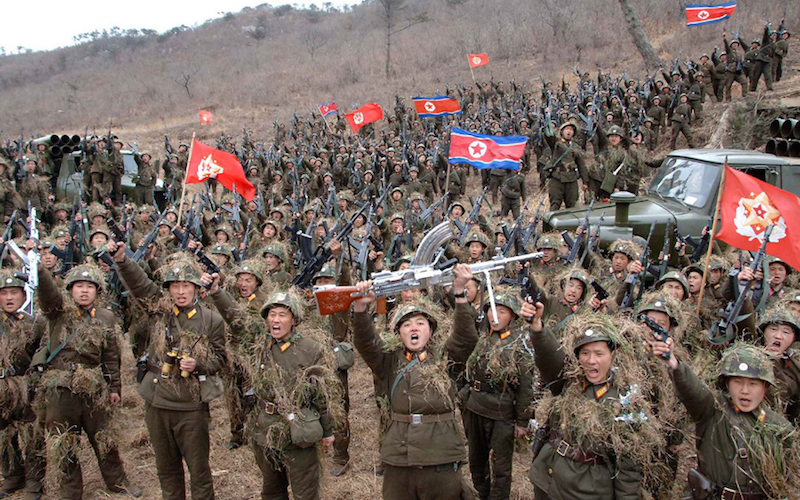
Strategic Alliance: China-North Korea
The relationship between China and North Korea has evolved over time since it began during the Korean War. China fought alongside North Korea during the Korean War to protect their mutual ideology of Communism (at the time at least), maintain border control and safeguard sovereignty. Today both states view each other as allies sharing common values and converged interests. After the Korean War, the peninsula was divided and China offered political and economic backing to North Korea’s leaders: Kim Il-Sung, his son Kim Jong-Il and his son and successor, Kim Jong-Un. Today North Korea is an important ally and trading partner of China. An estimated 300,000 North Koreans live in China. Many are migrant workers who send much-needed remittances back home to relatives.
China has always provided assistance and support to the regimes in North Korea, currently sustaining Kim Jong-Un’s authoritarian leadership. China opposes heavy economic sanctions on the DPRK due to the negative spillover effect sanctions would have in China. Although China generally supports the DPRK it is willing to object to and criticize its neighbor. For instance during North Korea’s testing of nuclear weapons in October 2006 and May 2009 respectively, China criticized North Korea’s actions and further agreed to the United Nations Security Council Resolution 1718 (2006) and Resolution 1874 (2009) which imposed sanctions on DPRK. China hoped that the Six Party Talks, through dialogue, could settle the proliferation issue. Despite this China continues its support for the DPRK and provides humanitarian assistance
State visits between the two enhance further cooperation and solidify the existing bonds. The DPRK leader, Kim Jong-Il, visited China four times in 2010-2011, the most a state leader has ever made to China.
North Korea is economically dependent on China for its basic necessities like energy and food which dominate the trade between the two countries. China provided North Korea with 70 percent of its food and about 70-80 percent of the country’s fuel supplies. Trade between the two states has increased rapidly over the past years.
In 1999 for instance, fuel and energy commodities between China and North Korea accounted for $370 million dollars and this accelerated to $1.6 billion dollars in 2005. Other merchandize also doubled from $490 million dollars in 1995 to $1.1 billion dollars in 2005. According to the recent report by the China Post, bilateral trade between these two countries has almost doubled in 2011 compared to 2010. The increase in 2011 of 87% brings the total amount to US$3.1 billion in trade between the two states.
In the political and security arena, China’s continuous support for the regime in North Korea has enabled Kim Jong-Un to gain much needed political support to sustain his regime and provides a balance against other powers like the United States or the United States-South Korean Alliance. The 1961 Sino-North Korean Treaty of Friendship, Cooperation and Mutual Assistance states that China will come to the aid of North Korea should it suffer an unprovoked attack by its adversaries. Military exchanges are also evident between the two states. In November 23, 2009, Chinese Defense Minister, Liang Guanglie, visited Pyongyang in order to promote friendly exchanges and cooperation between the armed forces and the people.
China and North Korea share mutual interests. First and foremost is regime preservation. Both China and North Korea are socialist States with a single ruling party therefore they work together to ensure their ruling regimes are maintained in solidarity. China for instance foresees that the collapse of Kim Jong-Un’s regime would bring uncertainty to North Korea and would have a spillover effect in China as well. A new regime in North Korea might appeal to Western countries for assistance or strike new alliances with countries like South Korea, Japan or even the United States. This would destabilize North Korea’s relations with China, and the buffer zone will no longer be operational bringing the Western powers ever closer to the Chinese borders. North Korea shares the same concern. If the CCP collapsed China would no longer be able to provide assistance to the DPRK. The fear of regime change therefore creates a bond between the countries.
The issue of unification is also a mutual interest. North Korea wants to unify with South Korea, and China with Taiwan. Although China supports the unification process in Korea, it stresses the need that the process must be gradual and peaceful. As the scholar Zhang Yunling stated: “China supports Korean unification and hopes it to be achieved in a stable and gradual way in order to avoid any possible chaos or even disruption.”
However for North Korea to participate actively in the peace process in the peninsula, a peaceful and favorable environment must exist. China and North Korea share this goal and hope that powers like the United States will not interfere. China supports this goal through direct dialogue, reconciliation and cooperation between the two and encourages economic cooperation and prosperity as key factors in achieving unification. For this reason China continues to assist North Korea economically and believes that tougher sanctions on North Korea and isolation from the
International community are not productive. In early 2011, North Korea’s leader Kim Jong-Il visited China with the aim of reforming North Korea’s economic sector; he paid visits to Chinese factories and industrial sites which suggests that North Korea is trying to solve its current economic hardships. The International community should also be involved in this endeavor.
Both China and North Korea have agreed to a resumption of the Six Party Talks which pertain to North Korea’s denuclearization. However, their motives diverge. Although China and North Korea do share common interests there are areas where they do not agree nor have the same perspective. On the issue of nuclear proliferation, China supports denuclearization of the DPRK and would like the Korean peninsula to be free from nuclear weapons.
North Korea’s nuclear proliferation might pose uncertainties if the threat from North Korea is taken seriously by neighboring countries like South Korea, Japan or even Taiwan. South Korea, Japan or even Taiwan might also want nuclear weapons programs which would pose a threat to China and their relations with Japan or Taiwan are tenuous. This could lead to a nuclear arms race in the East Asian region in the name of national security which China does not support. China maintains a position and policy of a peaceful and harmonious world, whereby all countries work together in peace to achieve goals and objectives. North Korea, on the other hand, is not willing to end its nuclear program and its goal of becoming a nuclear state. North Korea wants the international community, including the United States, to recognize her as a nuclear state and argues that having nuclear weapons will be a deterrent to war on the Korean peninsula. As this Chinese Scholar Shen Dingli mentioned: “North Korea’s bold move to develop nuclear weapons also makes war on the Korean Peninsula more unlikely.”
The possibility of war on the peninsula is slim. Firstly, the United States military personnel stationed in East Asia is limited in number compared to the military personnel of North Korea. Only 30,000 United States troops are deployed in South Korea and 90,000 in total in the East Asian region. This number is low proportionally to the one million North Korean regular army and 6 million reserves that are all stationed in North Korea. This puts the United States Army at a disadvantage. As for conventional weapons, North Korea has adequate artillery and short-range missiles that are capable of creating enormous losses to the United States forces in South Korea. Nuclear weapons create an additional deterrent. If the United States takes pre-emptive action, it cannot ensure success without a heavy cost. Nuclear weapons are therefore very important to North Korea.
China understands that if war broke out in the Korean peninsula involving her, all the logic behind her peaceful position would end and her reputation and image would be adversely affected. China is bonded to North Korea under the 1961 Sino-North Korean Treaty of Friendship, Cooperation, and Mutual Assistance which states that China is obliged to defend North Korea against unprovoked aggression. However if a war began on the Korean peninsula, whether it be provoked or unprovoked, China would lose investments in North Korea, and its buffer zone. In this context, China wants to ensure that there is a peaceful settlement and hopes that the Six Party Talks resume as the path forward to achieve a nuclear free Korean peninsula.
There are complications in the relationship between the China and North Korea. Firstly, some Chinese advocate the abolishment of The Treaty of Friendship because the alliance no longer serves Chinese interests. A senior Chinese analyst said: “If an ally doesn’t act like an ally, then the other side might not want to do its part.”
He further stated that the Chinese government welcomes the ambiguity of the treaty, which in part leads North Korea to continue its nuclear program. North Korea feels that the ambiguity serves as a valid reason for its having nuclear deterrents.
North Korea’s testing of nuclear devices and missiles in 2006 and 2009 further complicates Sino-North Korea relations. Prior to the testing, China applied little pressure on Pyongyang other than stressing that testing missiles would result in negative expectations relating to the Sino-DPRK’ ties and the stability of North East Asia. The priority for China was to bring North Korea back to the Six Party Talks. However, once North Korea began testing missiles, China responded with condemnation and supported the United Nations Security Council Resolution 1781 which imposed sanctions on the DPRK.
Beijing’s harsh response was meant to be a wake-up call to the Kim Jong Il’s regime. Ignoring and damaging Chinese interests carries a cost and will not be tolerated. However, China continues to maintain its North Korean strategy through the following: Firstly, assuring stability in the Korean peninsula. China’s strategy is to ensure that the Korean peninsula sustains a peaceful environment and that the North Korean economy will improve through economic reforms. Should North Korea face another economic collapse, China would carry the burden of providing food and other basic necessities to DPRK, and the number of refugees fleeing to China would increase.
Secondly, China wants to maintain its safe economic investments in the DPRK and even wants increased economic ties particularly between China’s northeast provinces and North Korea’s northern region.
Thirdly, China positive relations with the DPRK provides assurance that there will remain a strategic buffer zone along its border because of North Korea’s strategic and geographical location which provides China a shield of protection from South Korea, Japan and the United States. This also decreases the need for mobilization of Chinese troops on its Northeastern border.
Finally, China’s efforts to resume the Six Party Talks not only ensure peace and stability on the Korean Peninsula, but in the whole East Asian Region.
The relationship between China and North Korea has adjusted and changed since the Korean war as the international system changes and both countries have their own and sometimes divergent national interests to protect. The relationship between the two states is complicated and will remain beneficial only through strategic means and not by traditional alliance policy.
